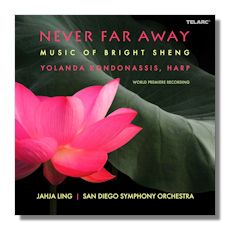
The Internet's Premier Classical Music Source
Related Links
- Bright Sheng Reviews
- Latest Reviews
- More Reviews
-
By Composer
-
Collections
DVD & Blu-ray
Books
Concert Reviews
Articles/Interviews
Software
Audio
Search Amazon
Recommended Links
Site News
 CD Review
CD Review
Bright Sheng

Never Far Away
- Shanghai Overture
- Never Far Away 1
- The Nightingale and the Rose
- Tibetan Love Song and Swing
1 Yolanda Kondonassis, harp
San Diego Symphony Orchestra/Jahja Ling
Telarc CD-80719 DDD 67:56
It's good, in recessionary times, to see the major classical labels occasionally releasing something unexpected, rather than the umpteenth version of Pictures at an Exhibition or Mozart's Requiem. Bright Sheng (b. 1955) writes identifiably modern music, although his style is rather conservative. (If you can tolerate Bartók's The Miraculous Mandarin – a work that appeared in 1916 – you'll be fine with Sheng.) Were it not for the Asian elements in his music, I don't think it would have the following that it currently has.
Sheng was born in Shanghai and, once the Cultural Revolution ended, studied at the conservatory there. He came to the United States in 1982, studied at Queens College and Columbia, and was mentored by Leonard Bernstein. Today, he teaches at the University of Michigan, where he is the "Leonard Bernstein Distinguished University Professor of Composition."
The four works on this CD are recent ones, with the exception of Tibetan Love Song and Swing, which is a compilation of Tibetan Swing from 2002 and La'i from 2004. Never Far Away, which gives this disc its title, is an ambitious concerto for harp and orchestra – a not overly populous genre. It was co-commissioned and premièred by the San Diego Symphony Orchestra, and is dedicated to Kondonassis. Sheng's writing for the harp is highly effective, and I was not surprised to read that Kondanassis played an active role in the concerto's composition. The harp is stereotyped as an instrument suited only to ethereal, delicate music, and Sheng's concerto, although it has its ethereal and delicate moments, demonstrates the harp's potential for muscle and for drama. The first two movements ("Moonlight Shadows" and "The Drunken Fisherman") were inspired by a Chinese folk song and a standard instrumental work in the Chinese classical repertory, respectively. The last ("Doctored Pentatonics") is more abstract, but seems to flow naturally from what preceded it.
Shanghai Overture also was inspired by Chinese classical music, and is dedicated to the Shanghai Conservatory of Music. The music is nothing if not colorful, and some might find its almost Hollywood-like gush excessive. (If a Western composer wrote like this, someone probably would sniff that he was too reliant on musical clichés!) The Nightingale and the Rose is a ballet score, composed when Sheng was the New York City Ballet's resident composer. Based on Oscar Wilde's short story, the ballet was considered an artistic success, and Sheng's sweet yet often macabre music surely contributed to that success. Here, the apparent influence of Bartók (and, at one point at least, Debussy) is particularly strong. Tibetan Love Song and Swing reminds us that Sheng spent – not by his own choosing! – a large chunk of his formative years in a Chinese province adjacent to Tibet. These were not wasted years, and it is intriguing to hear how Sheng created a colorful but not merely "pops-y" work from them. Indeed, this suite is more substantial than the Shanghai Overture. The title's "swing" is a bit of a red-herring, though – anyone expecting to allusions to Benny Goodman, for example, will be disappointed!
Kondonassis is, as expected, absolutely fantastic in the concerto, and the San Diego Symphony Orchestra, not a major presence in the discography of American orchestras, makes a fine impression here under Ling's direction. One is reminded how prohibitively expensive it has become to record American orchestras, yet many fine American orchestras might thrive if given such an opportunity. (European orchestras one has never even heard of make CDs as often as mushrooms spring up.) Telarc's engineering is very much up to house standards. I don't find Sheng's music to be particularly "deep," but he is a very entertaining composer – and there's nothing wrong with that – and his recent work is well presented on this new CD.
Copyright © 2009, Raymond Tuttle




















